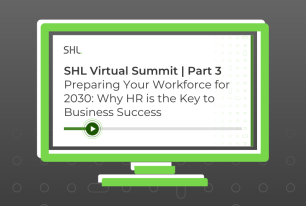Talent Interventions in an Everchanging and Virtual World
The transition to a virtual world is placing us in the unique position to rethink how we design and deliver our Development Centers.
Share
The concept of having virtual assessments is not new to the world. Psychometric tests have been administered unproctored online since the turn of the century, the virtual inbox concept came to life several years ago and virtual interviews and gamified or virtual reality assessments are increasingly being used in assessing for recruitment purposes.
However, assessments for development, such as development centers used to identify future leaders, typically place more emphasis on group interaction, and because of the logistics and complexity of this type of event, are designed to be executed face-to-face. In today’s evolving environment businesses can no longer afford to put their leadership development interventions on hold, yet external circumstances make it impossible to bring global talent together in one location or set up face-to-face meetings in general.
At the start of the pandemic, many organizations found it necessary to delay talent development programs whilst they grappled with immediate challenges; furloughed workers, engaging a virtual workforce, reducing costs, and re-inventing their own products and services. However, forward-thinking organizations are realizing the importance of building leadership capability – now more than ever, as they ask their leaders to constantly navigate new business challenges and support their people through change. And because it is common knowledge that a leader’s capability directly impacts on engagement, through building trust, ensuring support, and building psychological safety, learning and development have now risen to the top of the organization’s agenda.
Forward-thinking organizations are realizing the importance of building leadership capability – now more than ever.
Like many business processes, development centers have required talent professionals to re-think their approach and overcome challenges that occur in today’s environment. We’ve found our clients and their candidates wanting more than just an assessment. They want an immersive experience through interactive assessments and opportunities to learn from peers and colleagues. It is simply not enough to transfer the traditional development center content online, as it takes away a major part of the experience. So which steps are necessary to take, to create an engaging virtual experience for future leaders, whilst maintaining the consistency and objectivity of a rigorous assessment?
- Offer flexibility
The shift to virtual makes it easier to provide scalable and flexible solutions. Consider implementing timings that suit participants and assessors from different time-zones. We’ve found that converting a full 2-day development center into 3- or 4-day events with more modular sessions continues to maintain engagement and momentum, as well as being able to accommodate participants and assessors from across the world. - Use technology that will create an engaging and immersive experience
Establish an interactive platform for your virtual Assessment and Development Center, simulating real-life and having the ability to move into a live interaction with assessors and other participants, by means of a 1-1 presentation, coaching meetings, or group interactions. - Keep it interactive
Development centers bring opportunities to network with other talented colleagues in different functions and locations. When the face-to-face element is removed it easily feels like a standard selection or assessment event. Finding ways to enable participants to interact through virtual icebreakers, networking activities, and group discussions helps to maintain engagement. - Create a day-in-the-life scenario
Create a day-in-the-life scenario that immerses the participants in a true to life case-study. Develop a mix of simulations – e.g. a business presentation, coaching meeting, and group meeting – alongside other participants that work together on the same business case and bring in real-life leader challenges. This will create a meaningful experience that replicates a leader’s typical day. - Encourage sharing insights and learning on the go
Development works best when feedback and coaching are provided in the moment, so although this is virtual, don’t miss out on opportunities to build this live interaction post-exercise, as well as creating reflection points and opportunities to share learning.
Find out more about SHL’s Virtual Assessment and Development Center.









